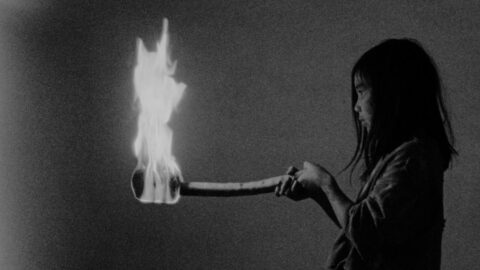Do you know that feeling when you are walking around a museum of modern art and you come across a video installation and you sit on one of those uncomfortable benches — sometimes stone, sometimes wooden — or you set up one of those tripod chairs that you have taken around with you, and you squirm a little in your seat as you watch the little arthouse film unfold: perhaps just a couple of people talking, or simply a still shot of something; but certainly not mainstream cinema. Interesting, you might think, politely, wanting to engage with all the art in the exhibition and not just the stuff that speaks to you, but it would probably be too much to watch the entire thing in one go.
Mare’s Nest (Ben Rivers, 2025) is like watching the entire thing in one go, a haphazard collection of different ideas about society, art and life after the apocalypse. It certainly feels better suited in video exhibition form than playing in cinemas at feature length. In fact, to extend the exhibition metaphor, I would rather have walked between its different elongated scenes than have to watch them in such a quixotically enervating procession.
It starts promisingly enough, with what immediately appears to be the end of the world. A tortoise is caught from above, placidly enough, before a car crash occurs off-screen, and the little guy darts back into his shell. The owner of the destroyed car is Moon (Moon Guo Barker), who picks up the tortoise and gives him a pocket lecture about the history of evolution, all caught in one captivating take.
I couldn’t help but be reminded of The Life of Chuck (Mike Flanagan, 2024), which I just caught this week in the cinema. Like the sentimental, Tom Hiddleston-starring film, Mare’s Nest is obsessed with the beginning and ending of all things, while yearning for profound answers through the power of an endless monologue. Yet the comparisons end at a thematic level, because, unlike the quirky, yet ultimately straightforward Stephen King adaptation, Rivers’ dense and obtuse work, based upon Don DeLillo’s one-act play The Word for Snow (2007), is the far more difficult vision. It’s also far less entertaining
This is my first encounter with the work of Ben Rivers, who undoubtedly, with over 50 credits to his name, spanning features, documentaries and innumerable shorts, is one of those filmmakers whose work probably becomes richer the more that you absorb and observe. But this sentiment is true for many filmmakers. For example, my first James Benning (another so-called difficult and “boring” auteur), Little Boy (2025) was only a month ago at Karlovy Vary — and despite being told that it was one of the worst entry points to the famed American’s filmography, I mostly vibed with its staunch political stance and rigorous aesthetic.
Therefore, saying I should watch more Ben Rivers to understand this one is not much of a cover. I found my first one, a tale of a decaying world inhabited solely by children, completely stultifying, lacking any unifying style — bouncing between digital and film, gorgeous colour and rigid black-and-white, wordless scenes and never-ending word games — to justify its long descent into an arthouse apocalypse. While undeniably the work of a serious artist, with many beautiful compositions to boot, including one of a cave that felt like it was plucked right out of a romantic-era painting, the final effect is one of unyielding, untainted boredom.
Near the end, we hear the song “Too Many Questions” by French punk group Frustration, a band whose name perfectly sums up my prevailing sentiment during this meandering, painful film. I wasn’t thinking of too many questions either.
Redmond is the editor-in-chief of Journey Into Cinema.




